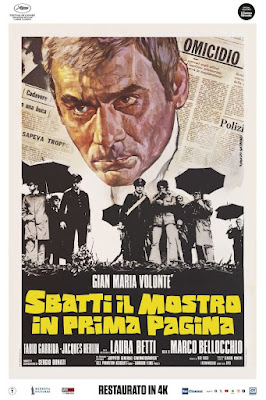Marco Bellocchio’s tour de force media satire Slap the Monster on Page One was a confluence of thrilling genre cinema and radical political filmmaking, with the pulpy title splendidly mirroring the film’s biting tone, incendiary theme and hardboiled form. Written by Sergio Donati who’s best-known for his collaborations with Sergio Leone, the film continued – with cutting fury – Bellocchio’s blazing and subversive streak from Fists in the Pocket and China Is Near, albeit with the polemic turned up a notch along the lines of Rosi, Pontecorvo and Petri. It began on a throbbing note as documentary footage – including a reactionary speech being delivered by Ignazio La Russa, a right-wing politician who’s presently Italy’s President of the Senate, to vilify surging left-wing rallies and anti-government demonstrations – segued into the narrative as a group of young rebels is seen pelting stones into the office of Il Giornale, a newspaper that peddles fascist agenda to its conservative readers. Its powerful and sleazy editor-in-chief Bizanti (Gian Maria Volonté) injects news items with nefarious slants and insinuations with aims of “indirect propaganda” aligned to the business interests of his odious boss (John Steiner); the sequence where he coaches a young reporter, while “fixing” his write-up, was both disturbingly prescient and savagely funny. When a beautiful college student belonging to a bourgeoise family is found raped and murdered, Bizanti laps up this “golden opportunity” to concoct a false narrative – and clinically frame a left-wing activist for the violent crime – to further the political machinations of his power-seeking boss ahead of upcoming elections. Volonté was frighteningly brilliant as the kind of rotten, self-serving and manipulative dealer in disinformation and fake news that’s infested today’s reactionary mainstream journalism.
Director: Marco Bellocchio
Genre: Black Comedy/Political Thriller/Political Satire/Social Satire/Media Satire
Language: Italian
Country: Italy















